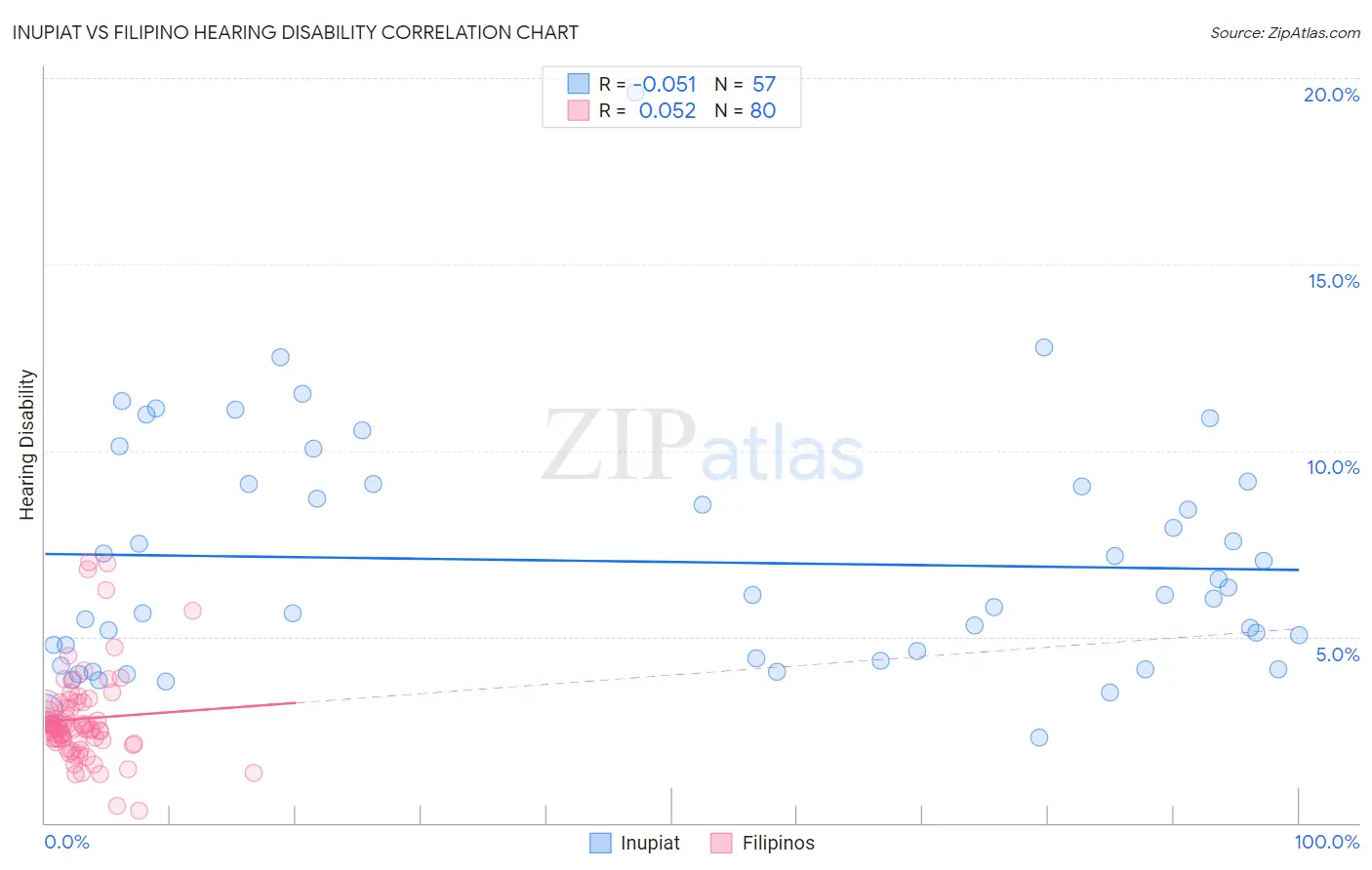Inupiat vs Filipino Hearing Disability
COMPARE
Inupiat
Filipino
Hearing Disability
Hearing Disability Comparison
Inupiat
Filipinos
4.7%
HEARING DISABILITY
0.0/ 100
METRIC RATING
343rd/ 347
METRIC RANK
2.6%
HEARING DISABILITY
99.6/ 100
METRIC RATING
33rd/ 347
METRIC RANK
Inupiat vs Filipino Hearing Disability Correlation Chart
The statistical analysis conducted on geographies consisting of 96,332,419 people shows a slight negative correlation between the proportion of Inupiat and percentage of population with hearing disability in the United States with a correlation coefficient (R) of -0.051 and weighted average of 4.7%. Similarly, the statistical analysis conducted on geographies consisting of 254,308,398 people shows a slight positive correlation between the proportion of Filipinos and percentage of population with hearing disability in the United States with a correlation coefficient (R) of 0.052 and weighted average of 2.6%, a difference of 81.0%.

Hearing Disability Correlation Summary
| Measurement | Inupiat | Filipino |
| Minimum | 2.3% | 0.31% |
| Maximum | 19.6% | 7.0% |
| Range | 17.3% | 6.7% |
| Mean | 7.0% | 2.8% |
| Median | 6.1% | 2.6% |
| Interquartile 25% (IQ1) | 4.4% | 2.2% |
| Interquartile 75% (IQ3) | 9.1% | 3.2% |
| Interquartile Range (IQR) | 4.7% | 0.96% |
| Standard Deviation (Sample) | 3.2% | 1.3% |
| Standard Deviation (Population) | 3.2% | 1.2% |
Similar Demographics by Hearing Disability
Demographics Similar to Inupiat by Hearing Disability
In terms of hearing disability, the demographic groups most similar to Inupiat are Tsimshian (4.7%, a difference of 0.21%), Navajo (4.6%, a difference of 1.8%), Pueblo (4.6%, a difference of 2.1%), Tlingit-Haida (4.8%, a difference of 2.7%), and Choctaw (4.5%, a difference of 3.6%).
| Demographics | Rating | Rank | Hearing Disability |
| Dutch West Indians | 0.0 /100 | #333 | Tragic 4.3% |
| Aleuts | 0.0 /100 | #334 | Tragic 4.3% |
| Kiowa | 0.0 /100 | #335 | Tragic 4.3% |
| Creek | 0.0 /100 | #336 | Tragic 4.4% |
| Chickasaw | 0.0 /100 | #337 | Tragic 4.5% |
| Alaska Natives | 0.0 /100 | #338 | Tragic 4.5% |
| Choctaw | 0.0 /100 | #339 | Tragic 4.5% |
| Pueblo | 0.0 /100 | #340 | Tragic 4.6% |
| Navajo | 0.0 /100 | #341 | Tragic 4.6% |
| Tsimshian | 0.0 /100 | #342 | Tragic 4.7% |
| Inupiat | 0.0 /100 | #343 | Tragic 4.7% |
| Tlingit-Haida | 0.0 /100 | #344 | Tragic 4.8% |
| Alaskan Athabascans | 0.0 /100 | #345 | Tragic 5.3% |
| Colville | 0.0 /100 | #346 | Tragic 5.3% |
| Yup'ik | 0.0 /100 | #347 | Tragic 5.8% |
Demographics Similar to Filipinos by Hearing Disability
In terms of hearing disability, the demographic groups most similar to Filipinos are Immigrants from Pakistan (2.6%, a difference of 0.040%), Salvadoran (2.6%, a difference of 0.16%), Immigrants from Venezuela (2.6%, a difference of 0.26%), Okinawan (2.6%, a difference of 0.39%), and Immigrants from Cameroon (2.6%, a difference of 0.40%).
| Demographics | Rating | Rank | Hearing Disability |
| Immigrants | Senegal | 99.7 /100 | #26 | Exceptional 2.6% |
| Immigrants | South Central Asia | 99.7 /100 | #27 | Exceptional 2.6% |
| Immigrants | Haiti | 99.7 /100 | #28 | Exceptional 2.6% |
| Bolivians | 99.7 /100 | #29 | Exceptional 2.6% |
| Immigrants | Caribbean | 99.7 /100 | #30 | Exceptional 2.6% |
| Immigrants | Cameroon | 99.7 /100 | #31 | Exceptional 2.6% |
| Immigrants | Venezuela | 99.7 /100 | #32 | Exceptional 2.6% |
| Filipinos | 99.6 /100 | #33 | Exceptional 2.6% |
| Immigrants | Pakistan | 99.6 /100 | #34 | Exceptional 2.6% |
| Salvadorans | 99.6 /100 | #35 | Exceptional 2.6% |
| Okinawans | 99.6 /100 | #36 | Exceptional 2.6% |
| Immigrants | Western Africa | 99.6 /100 | #37 | Exceptional 2.6% |
| Immigrants | Jamaica | 99.5 /100 | #38 | Exceptional 2.6% |
| Immigrants | China | 99.5 /100 | #39 | Exceptional 2.6% |
| Haitians | 99.5 /100 | #40 | Exceptional 2.6% |